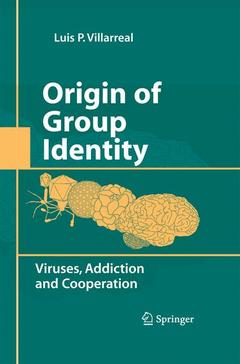Origin of Group Identity, 2009 Viruses, Addiction and Cooperation
Auteur : Villarreal Luis P.

Luis Villarreal is one of the most respected virologists in the country - if not the world; he is a true leader in the field
First volume to trace the evolution of biological identity systems from simple unicellular life forms, through the “tree of life” all the way to complex hominid social structures
Will also evaluate the role of genetic parasites in the origination of 'addiction' based molecular strategies
Date de parution : 11-2014
Ouvrage de 614 p.
15.5x23.5 cm
Disponible chez l'éditeur (délai d'approvisionnement : 15 jours).
Prix indicatif 158,24 €
Ajouter au panierDate de parution : 10-2008
Ouvrage de 614 p.
15.5x23.5 cm
Thèmes d’Origin of Group Identity :
Mots-clés :
evolution; microbe; microbes; molecular evolution; prokaryotes; the origin; virus



